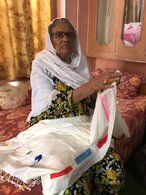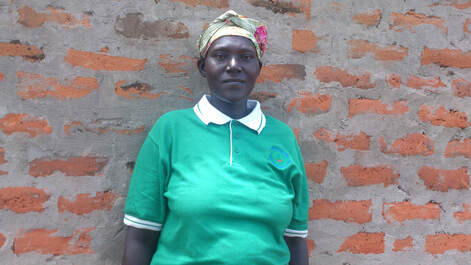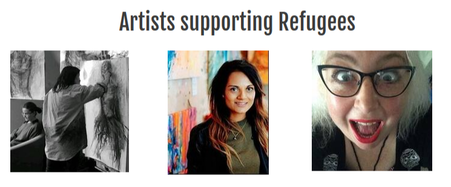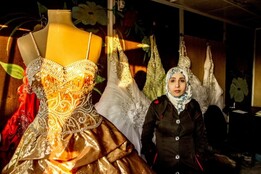|
Nick Lyall of Wicked Problems Initiative (WPI) interviewed Bizgees Co-founder Zufi Deo to discuss what Bizgees does and what we are trying to accomplish. WPI is an organization aiming to tackle the problem of forced migration and refugee crises. They are an all-encompassing hybrid of think tank, incubator, and consultancy which is determined to use interdisciplinary research and knowledge to facilitate and empower social enterprises such as Bizgees. This is an updated summary of the interview was edited by Layz Reyent & Zufi Deo - www.bizgees.org Q: Okay, so to start with, I'd like you if you're happy to, to describe BizGees, anything that's not already on your website. Specifically, focusing on the problem you're trying to solve. How does Bizgees address that problem or problems? A: So Bizgees as a concept came out of UNICEF Fintech Jam for Good 2016. … We won the INFOSYS challenge for financial inclusion. The focus was to support vulnerable communities become financially included. Our team came up with a solution to support refugees to access funds to help them with their businesses. We started off with refugee entrepreneurs inside UN camps. Just to give you some background, in Zaatari, Jordan, there are well over 3,000 micro businesses in operation today. Collectively, as an informal economy, it's well over 12 million pounds a month. So, within the UN Camp, they have a lot of restrictions they have to deal with. The point is, within that refugee camp, people are taking ownership of their own lives, they have a stipend from the UN every month. They've decided that they want to do more with their day than live off the money that the UN provided them with. They have a 1,001 different forms of economic activity going on there. We felt that if those entrepreneurs wanted to scale their businesses, they would find it very difficult to do without extra support. So, our initial solution was to support them by providing peer-to-peer micro loans using a mobile app. Below: Image of a female entrepreneurs renting wedding dresses in a UN Refugee Camp. We, then, pivoted away from Jordan to Uganda. In Uganda, refugees have the right to work. They are processed very quickly - usually two weeks. The state has a very progressive approach with accommodating refugees. We custom designed a revenue based financing micro loan with our local delivery partners - WSV.global. Our test micro loan has set up 2 micro businesses supporting 4 refugee women access training, inventory and business mentoring to set up in business. We have since also added another post conflict region - Swat Valley - to our portfolio of communities Here we support a local artisan community rebuild their lives and access the global marketplace using trade finance. Over this time we have evolved a human needs framework to help us custom design financial services for the communities we work with. So, you could say we are humanising financial services and more importantly the Fintech space.  Q: Brilliant, thanks very much for sharing that. And so, the next question is, and I realize you touched on aspects of this already, but what do you believe is the core value that Bizgees creates, for both your ‘customers and clients’ and also for the region or society? Specifically, if this value can be expressed in terms of specific outcomes you're achieving? So, if you're tracking your outcomes, is it possible for you to potentially share that data with WPI? A: Sure, we can break this down by stakeholders . One stakeholder is the refugee community in northern Pakistan, the Swat Valley. Their focus is on the women, artisans, who want to earn a living, but they can't leave their home, or they have other cultural constraints on being economically active, basically. We work with them to support them in working with designers in this part of the world. The outcome is women have access to work, and it is paid work that pays above the going rate. This isn't a poverty reduction program. This is a heritage preservation program. They have a high-end expertise in artisanship. Embroidery from that region, top-end embroidery, has a really strong global reputation that's been dying out over the years. We're trying to bring that back, trying to resurrect it. This way, it helps them with their identities and heritage as well, but also helps them earn a living, doing what they've done for centuries.  The second stakeholders are the refugees in Uganda, Cameroon, and Kenya. Through our delivery partners, we help them set up micro businesses. They receive training, inventory to set up their businesses, and business mentoring to set up successful micro businesses. This way, each of the refugees that passes through that process have training to be entrepreneurs. Even if their current businesses don't work, they still have the training, as entrepreneurs, and have the experience of what it means to set up a business. They can set up a second one, a third one, and this lowers the risk of failure. So that's the second one.  The third stakeholders are our volunteers who are based in the developed world. These are standard professionals looking to upskill and reskill themselves. If you've heard of how AI is changing the job market, how professionals, globally, feel threatened by technology and technological innovation; our volunteer program supports them in terms of upskilling themselves and reskilling themselves, and gives them the opportunity to learn a new skill, while they’re still in their old jobs. They don’t have to give up work, they just put in 6 to 8 hours a week with us, and in a period of time they learn new skills. So those are our third stakeholders.  Fourthly, there's the artists in London, at this stage, who are struggling to earn a living from their artwork. We go and help them sell the artwork and build up their brands and identify more opportunities, so that they can earn a living from the same artwork. This allows them to earn a living, build up the businesses, and be successful artists at the same time. We're starting off in the UK. So, we supported one fashion designer, for instance, to build up her exposure base. Finally, we promote positive consumption and eco & ethical supply chains. Climate change is here and we all have to take this change into account to change the way we do business. The funny thing is the artisan community we support already has a eco and ethical friendly approach - we just need to help them retain their traditional approach. In terms of the impact with those five stakeholders, that represents our business, essentially. We have an impact all the way from the refugee population in the developing world, professionals, mainstream professionals in the developed world, to artists, to fashion designers who are up and coming and want to build up their brands in an eco and ethical sensitive way. Q: Fantastic, yeah. Well there's extensive parallels between that ecosystem paradigm and the networked approach that WPI envisages we’ll be pursuing, as well. And I think, especially in the field of social change, it's so tractable, and so key to have that sort of mindset as well. It's always encouraging to come across others who are buying that approach as well. The next question would be to ask you to think about Bizgees in the context of the overall problem you're trying to address. But, more specifically, the networks that you're connected to. These could be other ventures like yours, larger initiatives, other organizations, the various actors that you've already discussed today. Who, or what organizations within this network, do you think are very important, or even the most important?
A: I think that’s quite relevant. The knowledge sharing allows us to shorten our innovation cycles. For example, WSV were our first delivery partners to work with refugees. We were able to co create our very first financial service with their support within a matter of months. The test micro loan is still ongoing and generating valuable data for us. This approach allows us to stay focused on what we are good at while meeting the holistic needs of the refugees we support. Absolutely. Well Zufi, I can absolutely guarantee that, as long as you're happy, I'll be definitely following up with substantial communication going forward. … So, I'm really looking forward to collaborating together into the future. I really appreciate you making the time today. So thank you very, very much. Comments are closed.
|


 RSS Feed
RSS Feed

